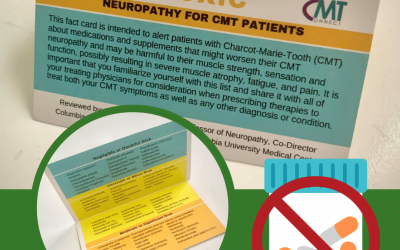1. Some drugs have been shown to cause nerve damage in CMT patients resulting in deterioration in strength that is not usually reversible even if the drug is stopped. Fortunately this is an uncommon situation and is best characterized by the recognized problems with vincristine. These drugs should never be used unless there is absolutely no alternative.
2. There are many drugs that cause clinically significant neuropathy and therefore are likely to result in worsening of CMT. These drugs have not necessarily been shown to have this effect in CMT patients but it just makes sense to avoid them if at all possible. Most of the drugs on the medication alert list fall into this category.
3. There are drugs that possibly cause neuropathy or cause a neuropathy that is clinically insignificant. Once again, it seems wise to avoid these drugs unless there is no suitable alternative. A good example of this is dilantin. It does seem to cause a neuropathy but it is rarely, if ever, clinically significant. However, I would not regard dilantin as a first choice in the treatment of epilepsy in CMT patients. On the other hand, if dilantin proved to be the most effective drug in controlling seizures, I would not hesitate to use it even in a CMT patient because the risk of seizures far outweighs the remote possibility that dilantin will make the CMT worse.
4. There are drugs that cause weakness by a mechanism unrelated to worsening of neuropathy. The best example of this is lipitor (and other statin drugs used to lower blood cholesterol). In rare instances they cause muscle damage and therefore could make a CMT patient worse even though the effect is not on the nerve itself. With these drugs, it depends on the balance of risks. A patient with very high cholesterol is at increased risk of death or disability from stroke or heart attack and this risk can be reduced with statins. However, if the cholesterol can be reduced through diet and exercise (not easy in CMT patients because of their difficulty exercising) then it would obviously be preferable to using a statin.
5. There are drugs that probably do cause a clinically significant neuropathy but only rarely and in certain susceptible individuals. Again, an example of this would be the statins (such as lipitor).
6. There are drugs that act on the central nervous system and cause fatigue and an overwhelming sense of weakness but which have no proven effect on nerves or muscle. The effects of these drugs are almost always reversible and the effects are very different for different individuals. A good example of this is amitriptyline. This, and similar drugs, are frequently used to treat neuropathic pain in CMT patients and while most experience some tiredness, some feel so exhausted that they can’t get out of bed. Usually the tiredness improves with time but not always; imovane is in this category. Since the effects are reversible I don’t hesitate to use the drugs but make my patients aware of the potential for extreme fatigue.The general principles for dealing with drugs in CMT patients is that you shouldn’t take any medication unless you need it; you should never take a known neurotoxic drug unless there is absolutely no alternative, and you should never take any drug that causes weakness and fatigue, even if it doesn’t directly affect the nerves, unless of course there is no alternative. Finally, you should always question your doctor and pharmacist about possible adverse effects of the drugs they are prescribing and dispensing, particularly in relation to your CMT.







I have CLL and HNPP and eventually will have to take treatment Imbruvica. I am really worried what this drug can do because none of my doctors have treated anyone with HNPP and CLL.
Is there someone out there that also is dealing with CLL with HNPP or CMT. Would like to hear your feedback.
In July of 2004,my doctor prescribed Levaquin for sinus infection. In less than two weeks I had severe leg cramps and my feet and legs became numb. I had to use crutches to walk. I still have to careful as to how long I can be walking before I need to sit down because of the leg cramps. I inherited cmt. Until I started taking Levaquin, I could walk around my 120 acre farm without a cane or crutch. Legal associates had an ad on tv about the damage like mine that Levaquin could cause.I contacted them and told them about my reaction to this drug was like they described in their ad. I had my doctor send my symptoms to them. However, after my doctor and I told them I had cmt, they refused to take my case against the pharmaceutical company.
Hi
I got muscle damage from Lipitor, and then got additional nerve damage from high blood levels of B6, which I took trying to fix the slow-healing muscle damage.
My mother had nerve damage, muscle damage and heart damage which I believe occurred over the course of time due to the staton drug crestor in Oct. 2015. A perfectly healthy women. She had to have heart valve replacement and has lost the use of her arms.
You said you sustained nerve and muscle damage can you be more specific . I am sure drugs were responsible for this.
Can someone with CMT have the vaccine for shingles?
I would check with your health care provider and keep the neurotoxic drug list handy. https://www.hnf-cure.org/neurotoxic-drugs/
Yes we sure can. After seeing 2 friends with shingles in a few months I knew I did not want them. One man went to doctor morning after shingles first appeared. Dr was able to treat and he was free of shingles within a week or so. My husband insisted they would go away, didn’t see a doctor for three weeks or more. Still fighting shingles several months later. He suffered a lot with this nasty stuff. My doctor said good idea for me to get shot which I did. No affects at all. Also no shingles. I have Cmt1A.
[email protected]
Hi Gary…I had the pneumonia shot. It was the best thing i ever did..I have never had it since. 🙂
Just inquiring if any one has a Pneumonia shot as i have had Pneumonia the last two christmases running and my doctor suggest i have it , Appreciate any input thanks all .
Hi Garry,
A good resource for you to ask others about a Pneumonia shot is the Inspire Support Community at https://www.inspire.com/groups/charcot-marie-tooth-cmt/. You can ask these types of questions and others that have CMT will give you advice.
Thanks,
Courtney
I have had the Pneumonia shot 3 times over the last 30 years. Until I got it I had Pneumonia quite often. I’ve not had it since. I have CMT but at the time I took the shots, I did not know I had it. Hope this helps.
I would like to share my experience, I had a flu shot called the Quad,supposed to take care of four strains of the flu. Four days of sever pain, cramps, headache,finger spasms,fever,chills,sweats,and weakness so sever I had to go to bed.No lasting side effects known.Would not recommend this shot to anyone with CMT.As you would expect the pharmacist did not know what CMT is.
People in General don’t know what CMT is! Massive cramps, migraine when the nerves wake up as I call it! I go numb in parts of my body ..lock up of hands feet ,jaw ..people have seen these things ..yes I have CMT and folks see this and want call ambulatory! No sense in that..nothing no one can do!! ..it’s attacks I get..charlie horse like cramps all over ..nothing scared! Lasting 5-45 mins pain is like tyson and mcgregor had there way with you! Even doctors I don’t think they know themselves ..as I get older each year gets worse! .. pot helps…but I’m God minded ..so I’m in trouble with him ! 3.5 grams a month ..few hits before bed sleep better less on attacks , unless you explain or let someone read material ..CMT unknown to most !!
In 1989 my son, 3 yrs old was undergoing chemo for Leukemia. He was given Vincristine and completely quit walking. The doctors had no idea why and after looking into our family medical history (dad had CMT) they decided to test me for it first, then Nicky. I tested positive for CMT, they started putting 2 and 2 together and tried halving his dose and he started walking again. My son was the first child to have Leukemia and CMT and this problem with vincristine that UC Davis had ever seen. He made a difference with this discovery in his short life for other children and adults with CMT. I am thankful that something good came from the loss of my precious son:0)
I’ve just come across this thread and wish to send you lots of love. I’m so sorry you lost a little one…❤️❤️❤️
Just wanted to share I am currently struggling with an UTI and because of my allergies the treatment they want to give me is Cipro. I believe Cipro is responsible for a lot of my progression the last couple years as I have been taking 4-6 times a year for sinus infection or UTI. I am sad that taking something that is supposed to help me may have made me worse. There is a class action lawsuit against Cipro if you did not already have peripheral neuropathy. This is similar to Allison’s story except the people with sudden neuropathy don’t have CMT. – Please read-
The FDA is strengthening its warning that a popular class of antibiotics, called fluoroquinolones, may cause sudden, serious, and potentially permanent nerve damage called peripheral neuropathy.
Fluoroquinolones are antibiotics that are commonly used to treat a variety of illnesses such as respiratory and urinary tract infections. These medicines include ciprofloxacin (Cipro), gemifloxacin (Factive), levofloxacin (Levaquin), moxifloxacin (Avelox), norfloxacin (Noroxin), and ofloxacin (Floxin). More than 23 million patients received a prescription for one of them in 2011.
Peripheral neuropathy is damage to the nerves that send information to and from the brain and spinal cord and the rest of the body. Damage interrupts this connection, and the symptoms depend on which nerves are affected. In general, the symptoms are in the arms and legs and include numbness, tingling, burning, or shooting pain.
Peripheral neuropathy has been listed as a side effect of fluoroquinolones since 2004. There have been reports of long-lasting nerve damage and disability in patients taking this type of medication.
I took statins for years